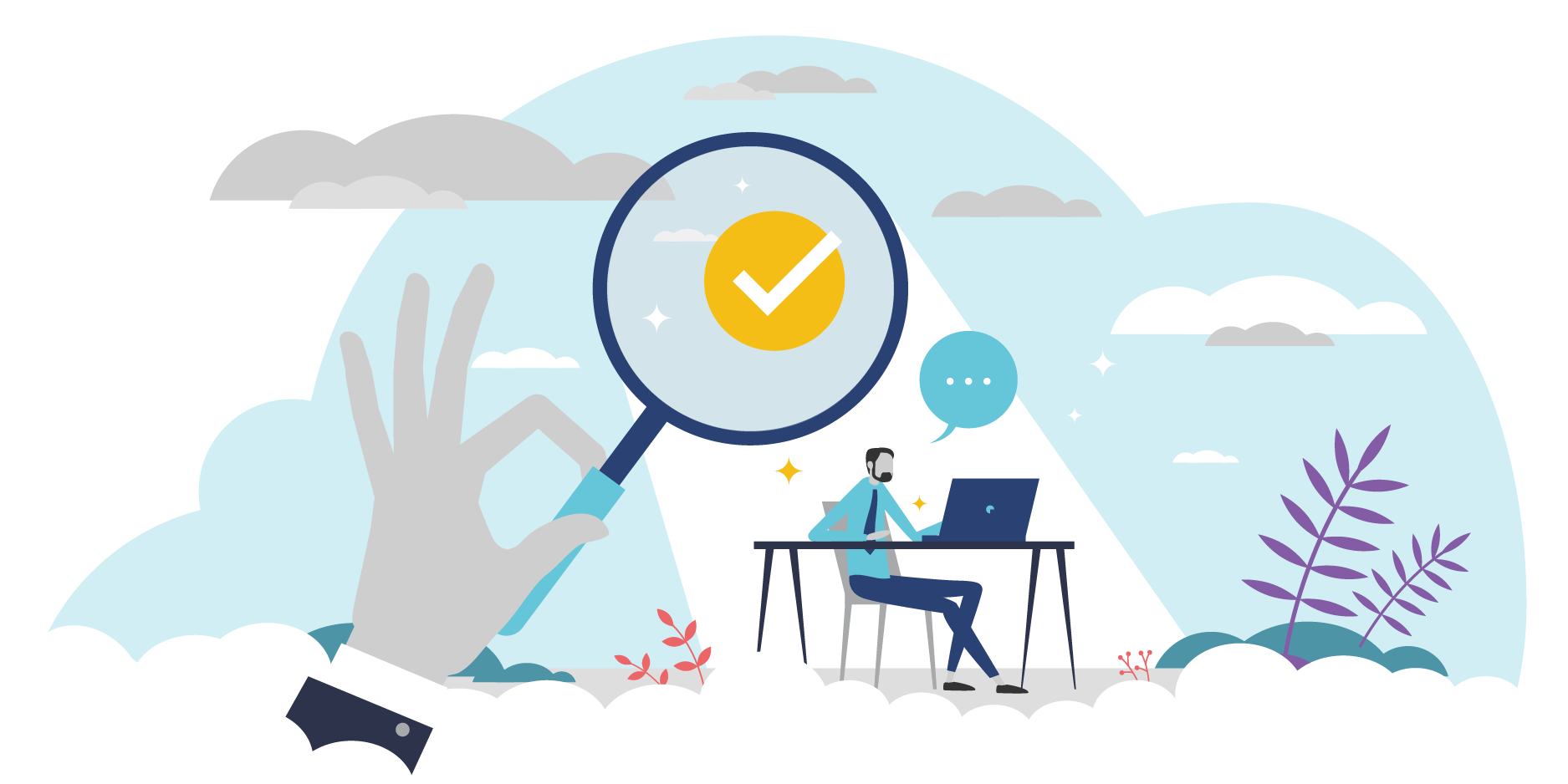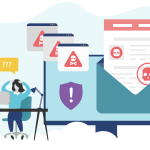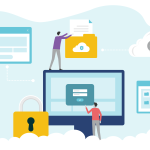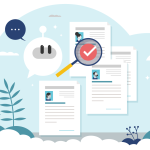Employee Snooping Risks: From Curiosity to Crisis
January 17, 2025

When most people think of privacy breaches, they picture hackers or cybercriminals infiltrating their systems to steal data and compromise networks. However, a privacy breach encompasses all kinds of unauthorized access—including actions from staff within your own company.
Employee snooping is an often overlooked, but increasingly common threat to businesses. It poses a significant risk of privacy breaches, eroding trust and jeopardizing compliance with data protection regulations.

But why does employee snooping happen, and how does it occur? What risks does it expose your business to? And more importantly, what strategies can you employ to address this internal threat head-on? Keep reading, and we’ll explore the hidden danger of employee snooping and share practical solutions to help you mitigate your risks.
Disclaimer: Please note that the information provided herein offers guidelines only. It is not exhaustive and does not constitute legal, insurance, or cybersecurity advice. For more guidance, please consult a lawyer, a licensed insurance representative, and/or a cybersecurity specialist.
What is employee snooping?
Let’s start with the basics: employee snooping occurs when staff within an organization access sensitive information outside of the scope of their job, without the proper authorization.
Employee snooping can occur for a variety of reasons, ranging from “harmless” curiosity to malicious intent. Poor access restrictions can inadvertently enable nosy employees to view details that don’t pertain to their role, like coworker salaries, sensitive client data, or company financial records. On the other hand, employees might actively seek out confidential details for their own personal benefit, such as using insider knowledge for financial gain or to leverage against workplace rivals.
What are the risks of snooping?
Under the Personal Information Protection and Electronic Documents Act (PIPEDA), organizations are required to protect personal information and restrict its access to authorized personnel for legitimate business purposes.
In addition, there are various provincial laws across Canada that focus exclusively on ensuring the confidentiality and security of personal health information collected for use in delivering healthcare services. For more information on this, check out Which healthcare privacy laws apply to my practice?
Not every snooping employee may be involved in an inside job or acting with malicious intent, but it’s important to remember that PIPEDA’s definition of a breach extends beyond cybercriminals. Ultimately, it doesn’t matter who accesses the data—whether it’s a hacker, a curious employee, a third party, or even you—any unauthorized viewing of confidential personal information qualifies as a breach of security safeguards.
Suppose a snooping incident leads to a privacy breach that exposes client data to the public or a malicious third-party. In that case, you’d be required to notify all affected parties, and your organization could be held liable for non-compliance, leading to legal penalties and fines. Individuals impacted by the breach may also sue you for damages, further escalating the financial risks.
Beyond the legal consequences, compliance violations can severely impact a business’s reputation, leading to public scrutiny and diminished consumer trust. Additionally, your company may face operational disruptions, as considerable time and resources are redirected toward investigating the snooping incident, navigating regulatory inquiries, and managing public fallout.
RELATED: The Consequences of a Breach: Can your business survive a cyberattack?
How can you mitigate these risks?
While there’s no way to completely eliminate the possibility of human error or misuse, you can significantly reduce the likelihood of employee snooping by implementing the right strategies. Here are some measures you can take to strengthen your organization’s defenses and help foster a culture of accountability and trust:
1. Train your staff.
Privacy obligations are often introduced to employees as part of their orientation package during the onboarding process—but this shouldn’t be the only time they hear about these policies. It’s essential to provide regular training on data privacy laws, ethical data handling and cybersecurity best practices. This will help to keep the information fresh in people’s minds, and foster a culture of accountability and transparency. For organizations that regularly handle sensitive data, requiring employees to sign confidentiality agreements can further emphasize the point.
To deter those tempted to snoop, it’s your organization’s responsibility to clearly define the consequences of such behaviour—as the heightened likelihood of being caught drastically reduces the temptation to snoop. Employees should understand the significant risks and repercussions associated with snooping: not only would the organization suffer financial and reputational losses in the wake of a privacy breach, but the individual(s) involved in unauthorized access may face disciplinary action or termination.
RELATED: Security Awareness Training: What is it, Best Practices, & More
2. Enforce access control measures.
Poor access control is a critical cybersecurity vulnerability, and can enable unauthorized individuals to take advantage of enterprise networks. An employee’s access to information should be restricted on a need-to-know basis, reflecting the nature of their role. Encrypt sensitive files to further reduce the chance of unauthorized access.
Organizations should establish clear, documented processes for granting and revoking access, and ensure that updates are made promptly when employees change roles or responsibilities. This will help to maintain the integrity of sensitive data and minimize the risk of employee snooping—whether it’s intentional or accidental.
3. Conduct periodic privacy audits.
Privacy audits are crucial for identifying areas of weakness when it comes to your organization’s data security and access controls. Cyber incidents aren’t typically discovered right away—that’s why tools like access logs are essential for confirming instances of unauthorized activity. Review and audit these logs regularly, checking for any anomalies, such as repeated on unusual access to sensitive files.
Employee snooping allegations should be taken seriously and thoroughly investigated, followed by the appropriate corrective actions to prevent recurrence and protect the affected individuals. Organizations should establish clear protocols to ensure accountability, considering the spectrum of behaviors and circumstances surrounding each case, depending on its severity.
4. Invest in Cyber Insurance.
Even with the best precautions in place, there’s always the chance of a cyber incident—whether it originates from inside or outside your organization. Cyber Insurance provides a vital layer of protection to help your business manage the fallout of a data breach. To clarify, even if your organization is found negligent under a law—such as in cases involving an employee breach—cyber insurance can help mitigate the financial burden, allowing your organization to recover more effectively. The proper coverage will help you cover costs like legal fees, data recovery, and even potential loss of income in the event of a breach.
Some more coverage highlights include:
- A specialized data forensics team to investigate the cause of the breach;
- A legal breach coach to advise you on response and regulatory compliance;
- Client notification and credit monitoring for affected parties;
- PR consulting services to manage reputational harm;
- And more!
RELATED: All About Cyber Insurance: What is it, What’s Covered, and Why Do You Need it?
No matter how trustworthy you’d hope your employees to be, the risk of snooping is always there—but you don’t have to face it alone. By proactively implementing robust cybersecurity measures and investing in the right Cyber Insurance, you can safeguard your business against potential breaches and their costly consequences.
For extra peace of mind, connect with a trusted insurance broker like PROLINK for personalized advice and access to tailored coverage for your unique needs! With over 40 years of experience, we’ll take the time to understand your organization and craft a comprehensive plan that reflects your business goals, workforce needs, and industry standards—as well as the nature of the data you store. We’ll guide you through potential exclusions, ensuring your policy offers the right protection you need to stay covered, no matter how a breach occurs.
To learn more, visit our Cyber Security & Privacy Breach Tool Kit and contact PROLINK today!
PROLINK’s blog posts are general in nature. They do not take into account your personal objectives or financial situation and are not a substitute for professional advice. The specific terms of your policy will always apply. We bear no responsibility for the accuracy, legality, or timeliness of any external content.




